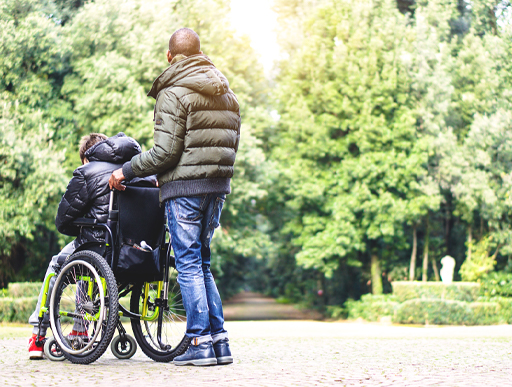6 Implications of the caring role on mental health
Data from Carers UK in 2019 and 2020 paints a concerning picture for the mental health of carers, which is perhaps not a surprise when you consider the list of challenges outlined in the previous section. Carers UK (2020a) identified that 70% of carers report negative effects on their physical and mental health, with carers rating their levels of anxiety at an average of 5.4 out of 10 compared with a population average of 2.9 out of 10 (Carers UK, 2019c). Indeed, carers looking after disabled children under the age of 18 years reported significantly poorer mental health, with 36% describing their mental health as bad or very bad (Carers UK, 2019d).

In the final activity in this session, you hear from Professor Mary Larkin who discusses the demands of caring and why these might make carers vulnerable to poor mental health.
Activity _unit2.7.1 Activity 6
First, listen to Audio 1 where Mary Larkin, Professor of Care, Carers and Caring from The Open University, discusses the factors that can impact on the mental health of carers, and what research tells us about it.
Transcript: Audio 1
Can you relate to any of the factors related to caring that are discussed? If you are not a carer, can you identify any of the factors that might impact on the carers from Activity 2?
Discussion
Professor Larkin discusses a number of factors that can impact on a carer’s mental health including those shown in Figure 8. You might have personally related to several of these, or have identified where there was the potential for them.
Now listen to Audio 2 where Professor Larkin explains what could be done to support wellbeing in the caring role. As you listen, reflect on the content and consider how the mental health of carers, such as the case studies in Activity 2, can be supported.
Transcript: Audio 2
Discussion
Professor Larkin made several suggestions that could support the three carers from Activity 2 including:
- joining a carer group to share experiences
- taking a break from caring – even if for a couple of hours
- accessing online support from caring organisations
- talking to family and friends
- using interventions such as psychotherapy, counselling and mindfulness
- accessing specific support where applicable, such as the Strategies for Relatives for carers of those with dementia (see the Further reading at the end of the course for the link to this initiative).
- developing resilience.
One key feature of support for carers was the importance of carers having a ‘package of strategies’ that works for them.
Professor Larkin highlighted the use of physical activity as one mechanism to promote health and wellbeing in the caring role. This will be the focus of Session 2.
Much research and associated narrative has focused on the negative consequences of caring. It is important, however, to consider these views alongside the co-existing satisfactions and intrinsic benefits of caring (Larkin et al., 2019). For example, the relationship can be beneficial to both parties, the carer and the care recipient, by providing an opportunity to celebrate the small things, resolve any past conflicts, develop personal strength and experience the cared person’s life more fully, by engaging with them on a deeper level than before (Hogstel, Curry & Walker, 2005).

